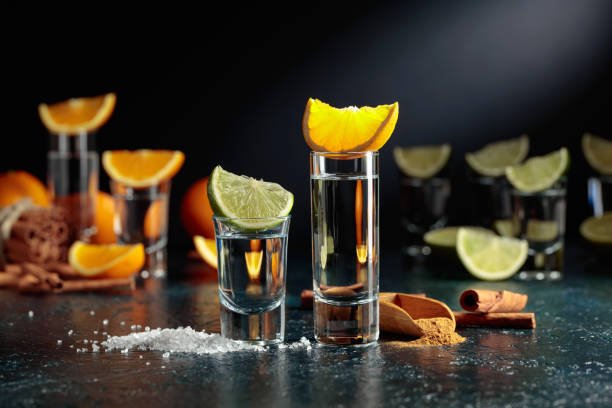
- calendar_month July 25, 2024
- folder Entertainment, La Life
Tequila has a dedicated space on the shelves of most bars and restaurants, but what is it?
And why is it so popular?
While tequila has a reputation for being the spirit of choice for college students and tropical vacationers, Fox News Digital spoke to two tequila experts for a deeper dive into the beverage and what makes it so unique.
For National Tequila Day — and every day — here are some interesting facts about this spirit, plus tips and tricks for crafting the perfect cocktail.
1. Tequila is 'heavily regulated'
"Tequila is an agave-based spirit that is part of the rich history of Mexico," Washington, D.C.-based Shivam Mallick Shah told Fox News Digital in an email.
Shah is one of the co-founders of 1953 Tequila.
"There are hundreds of varieties of agave, but only blue weber agave can be used to make tequila," she said.

Tequila is made from the blue weber agave plant. "It must be sourced from agave grown in select regions within Mexico and made by a select group of distilleries recognized by the Tequila Regulatory Council." (Ulises Ruiz/AFP via Getty Images)
But not just every spirit made from agave can be called a tequila.
Similar to champagne, "tequila is heavily regulated," she said.
5 COOL REGIONAL HOT DOGS TO DIG INTO FROM COAST TO COAST
"It must be sourced from agave grown in select regions within Mexico and made by a select group of distilleries recognized by the Tequila Regulatory Council. The resulting spirit must be certified as tequila by the Tequila Regulatory Council."
2. It's made of 'cooked hearts'
Tequila is made by "fermenting and distilling the cooked hearts of the blue weber agave," Ben Lieppman, beverage director at RPM Restaurants and based in Chicago, told Fox News Digital in an email.
After the distillation process, "the producer can opt to proof down, age or alter the spirit in other ways," he said, such as with additives.
There are different kinds of tequila, noted Shah: blanco, reposado, anejo, cristalino and extra-anejo.

Tequila "is the fastest-growing segment of the spirits sector," particularly among women drinkers, according to one expert. (iStock)
Blanco tequila, she said, is not aged and is, as the name suggests, usually clear.
Reposado is aged for "at least six months," she said, and has a golden color.
Anejo, extra-anejo and cristalino are all aged for at least 12 months. Extra-anejo is aged for at least three years.
Cristalino tequila is a filtered version of anejo tequila.
3. It's 'rich in heritage and history'
More than just a beverage, tequila is "rich in heritage and history," Lieppman said.
"The agave plant itself has been used by Mesoamerican peoples for thousands of years for food and for its utilities (such as the fibers, which can be used to make anything from baskets, to netting, to clothing)," he said.
Agave plants "were roasted in earthen ovens for sustenance, and then the result would often be fermented into a different type of alcoholic beverage," Lieppman said.

Tequila has a "rich heritage and history" in Mexico. (iStock; iStock; Getty Images)
"Eventually," he said, "distillation made its way into the region, and these fermented beverages became spirits."
"With this history, the central point of the tequila is the agave plant it comes from and how critical it has been to the region for so long," he said.
"How it's grown, how it's treated, when it's harvested and the production process it goes through should pay homage to that."
4. It's a ‘sophisticated spirit’
Unlike many other kinds of alcohol, tequila is "plant-based, so it is naturally low in sugar and keto-friendly," Shah said.
This is partially why "tequila is the fastest-growing segment of the spirits sector," she said, particularly among women drinkers.
"It is naturally low in sugar and keto-friendly."
And while tequila is often thought of as something that should be a "shot" at a party or mixed into a cocktail, Shah said she would dispute this.
"Although many of us first drank tequila as a shot or in a cocktail like a margarita, increasingly there is a growing understanding of tequila as a sophisticated spirit that should be sipped and savored neat," she said.

While it is common to drink tequila in shot glasses, a good tequila should actually be served neat and sipped, Shah said. (iStock)
When a person sips tequila, rather than shoots it, it's an entire sensory experience, she said.
"You will first notice the color and viscosity of the juice, followed by the aromas of the juice, and then you should take an actual sip and experience the mouthfeel and taste of your fine tequila," she said.
Lieppman agreed.
"A well-made tequila, whether it is blanco, extra anejo or somewhere in between, should be able to be sipped without the need of any lime, mixer or other fruit to help make the shot bearable," he said. "If you don't enjoy the tequila on its own, you likely haven't found the right one."

A cocktail should highlight, not hide, the tequila, two experts told Fox News Digital. (iStock)
He added, "The spirit itself should taste like the agave it came from, vegetal and herbaceous, lightly fruity, with a good amount of minerality."
When it comes to cocktails, both Lieppman and Shah agreed that simpler is better.
